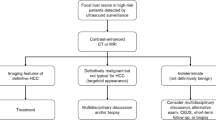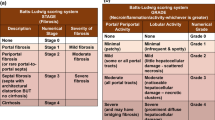Abstract
Background
Preoperative systematic inflammatory response, represented by neutrophil–lymphocyte ratio (NLR), platelet–lymphocyte ratio (PLR), lymphocyte–monocyte ratio (LMR), and C-reactive protein–albumin ratio (CAR), has been associated with long-term outcomes in patients with hepatocellular carcinoma (HCC). However, the impact of sustained systematic inflammatory response after resection remains unclear.
Methods
This study comprised 210 patients who had undergone primary hepatic resection for HCC between 2008 and 2018. Preoperative and postoperative NLR, LMR, and CAR were evaluated, and patients were then classified into three groups according to the status of each marker: persistently high inflammatory state (elevated group), preoperatively low inflammatory state (normal group), and preoperatively high but postoperatively low inflammatory state (normalized group). Multivariate Cox proportional hazard models were conducted to assess disease-free and overall survival, adjusting for potential confounders.
Results
In multivariate analysis, sex (p = 0.002), hepatitis B surface antigen (HBsAg) positivity (p = 0.002), serum α-fetoprotein (AFP) level ≥ 20 ng/mL (p < 0.001), multiple tumors (p < 0.001), microvascular invasion (p = 0.003), type of resection (p = 0.007), and elevated CAR (hazard ratio [HR] 2.40, 95% confidence interval [CI] 1.55–3.73; p < 0.001) were independent and significant predictors of cancer recurrence, while sex (p = 0.05), HBsAg positivity (p = 0.03), serum AFP level ≥20 ng/mL (p = 0.009), multiple tumors (p = 0.03), microvascular invasion (p = 0.006), and elevated CAR (HR 2.10, 95% CI 1.13–3.91; p = 0.02) were independent predictors of overall survival.
Conclusions
Sustained elevated CAR may be an independent and significant indicator of poor long-term outcomes in patients with HCC after hepatic resection, suggesting the interplay of the host’s inflammatory state and tumor recurrence and progression in HCC.



Similar content being viewed by others
References
Bray F, Ferlay J, Soerjomataram I, Siegel RL, Torre LA, Jemal A. Global cancer statistics 2018: GLOBOCAN estimates of incidence and mortality worldwide for 36 cancers in 185 countries. CA Cancer J Clin. 2018;68:394–424.
Shim JH, Jun MJ, Han S, et al. Prognostic nomograms for prediction of recurrence and survival after curative liver resection for hepatocellular carcinoma. Ann Surg. 2015;261:939–46.
Hou J, Karin M, Sun B. Targeting cancer-promoting inflammation—have anti-inflammatory therapies come of age? Nat Rev Clin Oncol. 2021;18:261–79.
Dolan RD, Lim J, McSorley ST, Horgan PG, McMillan DC. The role of the systemic inflammatory response in predicting outcomes in patients with operable cancer: systematic review and meta-analysis. Sci Rep. 2017;7:16717.
Mano Y, Shirabe K, Yamashita Y, et al. Preoperative neutrophil-to-lymphocyte ratio is a predictor of survival after hepatectomy for hepatocellular carcinoma: a retrospective analysis. Ann Surg. 2013;258:301–5.
Goh BK, Kam JH, Lee SY, et al. Significance of neutrophil-to-lymphocyte ratio, platelet-to-lymphocyte ratio and prognostic nutrition index as preoperative predictors of early mortality after liver resection for huge (≥10 cm) hepatocellular carcinoma. J Surg Oncol. 2016;113:621–7.
Itoh S, Yugawa K, Shimokawa M, et al. Prognostic significance of inflammatory biomarkers in hepatocellular carcinoma following hepatic resection. BJS Open. 2019;3:500–8.
Yamamoto M, Kobayashi T, Kuroda S, et al. Verification of inflammation-based prognostic marker as a prognostic indicator in hepatocellular carcinoma. Ann Gastroenterol Surg. 2019;3:667–75.
Kinoshita A, Onoda H, Imai N, et al. The C-reactive protein/albumin ratio, a novel inflammation-based prognostic score, predicts outcomes in patients with hepatocellular carcinoma. Ann Surg Oncol. 2015;22:803–10.
Chan JCY, Diakos CI, Chan DLH, et al. A longitudinal investigation of inflammatory markers in colorectal cancer patients perioperatively demonstrates benefit in serial remeasurement. Ann Surg. 2018;267:1119–25.
Yasui K, Shida D, Nakamura Y, Ahiko Y, Tsukamoto S, Kanemitsu Y. Postoperative, but not preoperative, inflammation-based prognostic markers are prognostic factors in stage III colorectal cancer patients. Br J Cancer. 2021;124:933–41.
Miyagawa S, Makuuchi M, Kawasaki S, Kakazu T. Criteria for safe hepatic resection. Am J Surg. 1995;169:589–94.
Strasberg SM. Nomenclature of hepatic anatomy and resections: a review of the Brisbane 2000 system. J Hepatobiliary Pancreat Surg. 2005;12:351–5.
Haruki K, Furukawa K, Fujiwara Y, et al. Effectiveness of anatomical resection for small hepatocellular carcinoma: a propensity score-matched analysis of a multi-institutional database. J Gastrointest Surg. 2021;25:2835–41.
Ueno S, Tanabe G, Nuruki K, et al. Prognostic performance of the new classification of primary liver cancer of Japan (4th edition) for patients with hepatocellular carcinoma: a validation analysis. Hepatol Res. 2002;24:395–403.
Sanghera C, Teh JJ, Pinato DJ. The systemic inflammatory response as a source of biomarkers and therapeutic targets in hepatocellular carcinoma. Liver Int. 2019;39:2008–23.
Taniguchi K, Karin M. NF-κB, inflammation, immunity and cancer: coming of age. Nat Rev Immunol. 2018;18:309–24.
Wan S, Kuo N, Kryczek I, Zou W, Welling TH. Myeloid cells in hepatocellular carcinoma. Hepatology. 2015;62:1304–12.
Medzhitov R. Origin and physiological roles of inflammation. Nature. 2008;454:428–35.
Yu LX, Ling Y, Wang HY. Role of nonresolving inflammation in hepatocellular carcinoma development and progression. NPJ Precis Oncol. 2018;2:6.
Xun Y, Tian H, Hu L, Yan P, Yang K, Guo T. The impact of perioperative allogeneic blood transfusion on prognosis of hepatocellular carcinoma after radical hepatectomy: a systematic review and meta-analysis of cohort studies. Medicine (Baltimore). 2018;97:e12911.
Shu H, Liu K, He Q, et al. Ulinastatin, a protease inhibitor, may inhibit allogeneic blood transfusion-associated pro-inflammatory cytokines and systemic inflammatory response syndrome and improve postoperative recovery. Blood Transfus. 2014;12(Suppl 1):s109-118.
Wei T, Zhang XF, Bagante F, et al. Postoperative infectious complications worsen long-term survival after curative-intent resection for hepatocellular carcinoma. Ann Surg Oncol. 2022;29:315–24.
Sirniö P, Tuomisto A, Tervahartiala T, et al. High-serum MMP-8 levels are associated with decreased survival and systemic inflammation in colorectal cancer. Br J Cancer. 2018;119:213–9.
Zaman K, Driscoll R, Hahn D, et al. Monitoring multiple angiogenesis-related molecules in the blood of cancer patients shows a correlation between VEGF-A and MMP-9 levels before treatment and divergent changes after surgical vs. conservative therapy. Int J Cancer. 2006;118:755–764.
Itoh S, Yoshizumi T, Yugawa K, et al. Impact of immune response on outcomes in hepatocellular carcinoma: association with vascular formation. Hepatology. 2020;72:1987–99.
Renne SL, Woo HY, Allegra S, et al. Vessels encapsulating tumor clusters (VETC) is a powerful predictor of aggressive hepatocellular carcinoma. Hepatology. 2020;71:183–95.
Kuang DM, Zhao Q, Wu Y, et al. Peritumoral neutrophils link inflammatory response to disease progression by fostering angiogenesis in hepatocellular carcinoma. J Hepatol. 2011;54:948–55.
Okadome K, Baba Y, Yagi T, et al. Prognostic nutritional index, tumor-infiltrating lymphocytes, and prognosis in patients with esophageal cancer. Ann Surg. 2020;271:693–700.
Garner H, de Visser KE. Immune crosstalk in cancer progression and metastatic spread: a complex conversation. Nat Rev Immunol. 2020;20:483–97.
Proctor MJ, Morrison DS, Talwar D, et al. A comparison of inflammation-based prognostic scores in patients with cancer: a Glasgow Inflammation Outcome Study. Eur J Cancer. 2011;47:2633–41.
Acknowledgments
None.
Funding
This work was supported by JSPS KAKENHI Grant Number JP21K08805, and research grants from the Uehara Memorial Foundation and Japanese Foundation for Multidisciplinary Treatment of Cancer.
Author information
Authors and Affiliations
Corresponding author
Ethics declarations
Disclosure
Koichiro Haruki, Tomohiko Taniai, Mitsuru Yanagaki, Kenei Furukawa, Masashi Tsunematsu, Shinji Onda, Yoshihiro Shirai, Michinori Matsumoto, Norimitsu Okui, and Toru Ikegami declare no conflicts of interest.
Additional information
Publisher's Note
Springer Nature remains neutral with regard to jurisdictional claims in published maps and institutional affiliations.
Supplementary Information
Below is the link to the electronic supplementary material.
Rights and permissions
Springer Nature or its licensor holds exclusive rights to this article under a publishing agreement with the author(s) or other rightsholder(s); author self-archiving of the accepted manuscript version of this article is solely governed by the terms of such publishing agreement and applicable law.
About this article
Cite this article
Haruki, K., Taniai, T., Yanagaki, M. et al. Sustained Systemic Inflammatory Response Predicts Survival in Patients with Hepatocellular Carcinoma After Hepatic Resection. Ann Surg Oncol 30, 604–613 (2023). https://doi.org/10.1245/s10434-022-12464-6
Received:
Accepted:
Published:
Issue Date:
DOI: https://doi.org/10.1245/s10434-022-12464-6




